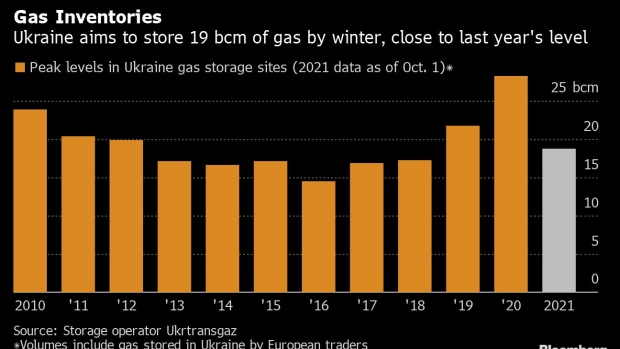Jul 15, 2022
Ukraine Needs Up to $12 Billion to Boost Winter Gas Reserves
, Bloomberg News

(Bloomberg) -- Ukrainian state-run energy company NJSC Naftogaz Ukrainy may need between $8 billion to $12 billion to purchase natural gas for winter after the government’s order to increase fuel reserves amid Russia’s invasion.
The company, which is buying gas now regardless how high prices are to fulfill the order, must raise volumes of the fuel held in storage to 19 billion cubic meters before the heating season that usually starts in mid-October, Chief Executive Officer Yuriy Vitrenko said Thursday in his office in downtown Kyiv.
Naftogaz initially planned to have 15 billion cubic meters of gas and resume purchasing fuel again in the fourth quarter, he said. Currently, the nation has 11.3 billion cubic meters in storage and stockpiling for the winter will be very difficult, Prime Minister Denys Shmyhal said separately Friday.
“We spoke to potential creditors, including the US government, but so far there are not commitments to provide us with the full amount,” said Vitrenko, who had to interrupt his interview because of air sirens. “Taking into consideration time limits, almost the only source is the state budget.”
Naftogaz also has some liquid assets it plans to sell, Vitrenko said without elaborating, citing security concerns. He also declined to say how much gas Naftogaz has imported already, citing the same reasons.
Vitrenko has been among top managers in Naftogaz for most of the period since 2014, when Russia cut off gas supplies to Ukraine’s domestic market. Now he leads the company as Russian troops are targeting Ukrainian towns and cities, affecting gas supplies to the civilian population, though the Kremlin is cautious to preserve pipelines and pumping stations used to carry Russian gas through Ukraine to European customers.
“So far, I can say that Russians are not targeting the gas transportation system deliberately, they deliberately mark it not to bombard, and not to damage anything linked to transit,” Vitrenko said. “But when they encircle towns, they put pressure on people, ruining civilian infrastructure.”
Vitrenko forecasts that Ukraine’s gas consumption will probably drop 30% this year as the economy deteriorates after Russia occupied some of the country, destroyed steel mills, factories and forced more than 5 million people to flee abroad.
Russia also cut gas transit via Ukraine since May 11 after the Sokhranovka cross-border point, also known as Sokhranivka in Ukrainian, was put out of service amid military actions and Russian occupation of the eastern part of the country. Ukraine, which was the key transit route for Russian gas, offered Russian state energy giant Gazprom PJSC to re-route gas flows but the proposal was rejected.
However, there is a so-called ship-or-pay clause in the current contract, which was signed in December 2019. As actual flows are lower than set in the deal, Naftogaz plans to meet with lawyers next week and “will work on the beginning of arbitrage” in Zurich, Vitrenko said.
Vitrenko helped Naftogaz win a $2.6 billion award from Gazprom in Stockholm arbitration in 2018 in a previous, four-year long dispute over the gas-transit contract.
©2022 Bloomberg L.P.






